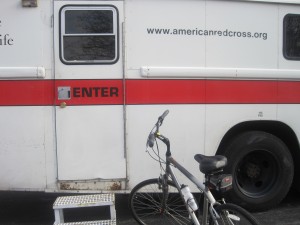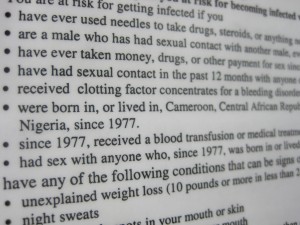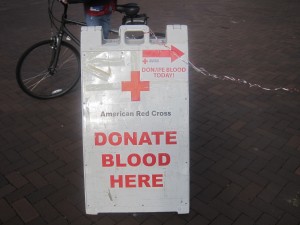 As soon as we passed by the Red Cross blood donation point at the SIUe quadrangle today, Chris and I, and managed to steer our conversation to donation of blood, I knew that I had come to another ktravula moment in the life of this journey. You see, I am conscious of all the dimensions of my Nigerianness, and about a year ago, just after I published my short story Behind the Door, I had had a conversation with an American friend who told me that she had been denied the chance to donate blood in America – for life – just because she ticked “yes” on a pre-donation questionaire that asked whether she has had “sexual contact” with anyone who was from or who had lived in Nigeria and some other sub-saharan African countries between 1977 to date. I didn’t believe it even after she sent me the online questionnaire, so I googled it up myself, and the result was indeed stunning. Nigerians, and everyone who has had sex with them were excluded from donating blood in America. (I don’t know yet if this is the same all over the world). The obvious question then is “Why?”, and it had circled my head for a while now, until that time this afternoon when I came within sight of the Red Cross truck on campus, asking students to donate blood. This website mentions requirements to donating blood in America but does not say why Nigeria is mentioned. So, you guessed it, I went right into the truck, leaving Chris outside to gape at what he said was an obvious time-wasting effort.
As soon as we passed by the Red Cross blood donation point at the SIUe quadrangle today, Chris and I, and managed to steer our conversation to donation of blood, I knew that I had come to another ktravula moment in the life of this journey. You see, I am conscious of all the dimensions of my Nigerianness, and about a year ago, just after I published my short story Behind the Door, I had had a conversation with an American friend who told me that she had been denied the chance to donate blood in America – for life – just because she ticked “yes” on a pre-donation questionaire that asked whether she has had “sexual contact” with anyone who was from or who had lived in Nigeria and some other sub-saharan African countries between 1977 to date. I didn’t believe it even after she sent me the online questionnaire, so I googled it up myself, and the result was indeed stunning. Nigerians, and everyone who has had sex with them were excluded from donating blood in America. (I don’t know yet if this is the same all over the world). The obvious question then is “Why?”, and it had circled my head for a while now, until that time this afternoon when I came within sight of the Red Cross truck on campus, asking students to donate blood. This website mentions requirements to donating blood in America but does not say why Nigeria is mentioned. So, you guessed it, I went right into the truck, leaving Chris outside to gape at what he said was an obvious time-wasting effort.
 There was a sign-in sheet on the table. It had the name of those who are on the waiting list. On the examination table is a young woman whose blood was being taken. She had a pump in her right hand.
There was a sign-in sheet on the table. It had the name of those who are on the waiting list. On the examination table is a young woman whose blood was being taken. She had a pump in her right hand.
“Hi. Can I help you?” A young lady approached me. She wore a white lab coat.
“Yes,” I replied. “I’d like to donate blood.”
“Alright. You will have to write your name in here. The next slot opens at 1.45pm, and there are about three people before you already. Is that fine?”
“Yes, of course it is. I can always come back. But I’d like to know if there’s anything I need to read before you take my blood. Maybe instructions or anything like that.”
“Sure. Here, on the wall, is the first instruction. It’s important to read and understand it. And here is the comprehensive manual that every donor must read and comply with.”
“Can I sit and read it in lieu of going and coming back?”
“Yes, why not. Please sit over there.”
“Thank you.”
 And read I did, carefully, until I got to where I am mentioned. Indeed, it’s written there in clear black ink of the excluded list. If you’re from Nigeria, If you have been to Nigeria, or had “sexual contact” with a Nigerian. Or if you have had malaria in the last three years, you CANNOT donate blood. I called her back and asked her why.
And read I did, carefully, until I got to where I am mentioned. Indeed, it’s written there in clear black ink of the excluded list. If you’re from Nigeria, If you have been to Nigeria, or had “sexual contact” with a Nigerian. Or if you have had malaria in the last three years, you CANNOT donate blood. I called her back and asked her why.
“HIV and AIDS, you know.”
“What?”
“HIV/AIDS”
“But you do know that not all Nigerians have HIV and AIDS, right?”
“I guess, but, erm, it’s what the FDA says. We just follow the law.”
“Oh my! So what you’re saying is that you have no way to know which blood is infected and which is not?”
“Like I said, it’s just the law, and we just follow it.”‘
By this time, a more mature looking woman also in a lab coat had shown interest in the conversation but maintained an aloofness that told me that she would allow the younger lady handle the situation rather than get involved. Whenever I looked in her direction expecting her to say something, she just smiled.
“I can’t believe this.” I said, as I gave back the booklet to her. “I guess I have to go now since you don’t want my blood.”

They didn’t say anything so I left, back to listen to Chris say “I told you so.” If she had said they do this because of malaria, I could have been a little more understandable. But AIDS? By population figures, there are probably more HIV infections in North America right now than in West Africa, but it is not so pandemic here because of adequate healthcare and healthy living. With the right technological advancement in medicine in the United States, this definitely did not have to be a factor for denying opportunity to a certain demographic to contribute to efforts to save lives worldwide. If I sound a little upset, it could be because I am at the incredulity of the whole matter. Maybe there are some things that people like me are not meant to understand.
23 Comments to The Blood Bank so far. (RSS Feeds for comments in this post)